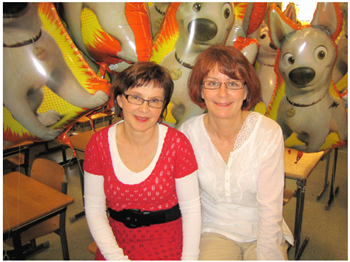Hanna Laakio and Eija Inberg, two primary school teachers from Puolala School, tell us about the joys and challenges of teaching a CLIL programme in Turku, Finland.
We are Hanna Laakio and Eija Inberg, two primary school teachers from Puolala School English Language Classes. We have both taught all primary levels 1-6 (7-13 years) and we are qualified as primary teachers to teach all subjects including formal English lessons.
 |
What do we do in Puolala school language classes?
Puolala School started CLIL classes in autumn 1990, and we consider ourselves sort of pioneers in this field. Classes start the first year of primary education and the programme ends after the 9th class, the last year of basic education in Finland. Our pupils are aged between 7 and 16. Puolala School also hosts German and Russian language classes, music classes and regular classes.
In our program, first class pupils begin to learn English within the normal curriculum programme. In other words, English can be introduced in small portions during all lessons except the mother tongue, Finnish. Content teaching begins already during the first year, but the use of the English language increases gradually, starting with 'baby steps'. During the third year the amount of content taught in English increases and formal English lessons begin.
Please see www.kieliluokat.fi pages for more information about Puolala School and other schools that offer CLIL programs in the Turku area.
What are the highlights of the CLIL project you are involved in?
Our greatest highlight has been building up our language class method and further developing our English class' CLIL teaching and curriculum during the years 1990-2009.
We have a strong professional teaching team for classes 1-9. Our team includes two qualified English teachers who are also native speakers of English.
We are a mainstream school and our approach to CLIL teaching is very practically oriented and requires hardly any extra resources apart from a trained and united teaching team. This isn’t our wish, but a requirement for our existence.
Co-operation with other CLIL schools and teachers of the Turku region has been fruitful and motivating. Our most recent highlight was the CLIL materials seminar in Germany and joining the CCN CLIL Cascade network.
Our school has an excellent and supportive Parent Association, which provides us with extra materials and helps us to arrange interesting events for both parents and children, such as a Welcome Back to School Party, Hallowe'en, Valentine’s Day and a European Day picnic.
Getting students interested in learning several languages is one of our aims. Most of our pupils choose an optional language at the age of 10. That means that they then study German or French as well as Finnish and English. At the age of 13 they will also start Swedish, because Swedish is the other official language of Finland. The European Framework in learning several foreign languages is really happening in our school!
And last but not least: our motivated, multi-talented pupils. We have an entrance test for the 5-6 year-olds before they can enter the 1st class. The test is carried out in Finnish only and it’s designed to spot language development problems rather than to find the best students. Being able to teach the same group of students for several years (all primary years 1-6) allows the teacher to see the huge progress and challenge each student experiences. Language development rarely happens as a linear function.
What professional opportunities regarding CLIL have you taken and what implications has this had in your teaching practice?
It seems that the best learning situations have been discussions with colleagues, benchmarking sessions and observing other teachers’ lessons in Finland and in other European countries. During the past years we’ve attended all possible CLIL-teaching courses and seminars at the Turku, Tampere and Jyväskylä Universities in Finland, and Hanna attended a CLIL course in Nile, Great Britain, some years ago. This April, we had the opportunity to participate in the Comenius Quality Criteria in CLIL-materials pilot seminar arranged by The Summer University of Lapland in Eichstätt, Germany. This is one of the seminars which we warmly recommend for all CLIL teachers. All these courses have offered marvellous opportunities for personal and professional development, and have provided opportunities for networking with other teachers and educators.
Can you say in a nutshell what have been the main challenges over the course of your work in CLIL?
- to find authentic materials
- to create or find curriculum based CLIL books, worksheets, etc.
- scaffolding
- to provide language support
- to make learning visible
- all this is possible but means hours and hours of work
Tell us a little about the impressions you get from parents about their children studying through the medium of English; what do they say about it?
At first they are a bit worried, then happy and amazed by the joy of learning our CLIL programme offers.
What advice would you give to teachers who want to take the CLIL challenge?
Go for it! It changes your world of teaching and learning.
Interview carried out by the CCN for onestopclil.
Topics
Your perspectives
- 1
- 2
- 3
- 4
- 5
- 6
- 7
- 8
- 9
- 10Currently reading
Northern CLIL: Greetings from Turku, Finland
- 11
- 12
- 13
- 14
- 15
- 16
- 17
- 18
- 19
- 20
- 21
- 22
- 23


No comments yet